Nursing Reflection: Mental Health Clinical Practicum Experience
VerifiedAdded on 2022/12/21
|6
|1582
|38
Journal and Reflective Writing
AI Summary
This reflective paper details a nursing student's experience during a clinical practicum, focusing on interactions with a patient suffering from dementia. The student describes the application of communication strategies and skills essential for nursing professionals working with mentally ill patients. Using the Gibbs reflection cycle, the paper analyzes the experience, including the development of a therapeutic nurse-patient relationship, effective communication techniques, and the management of patient anxiety. The student reflects on the feelings, evaluation, and analysis of the experience, highlighting increased confidence and the acquisition of critical nursing skills. The conclusion emphasizes the importance of reflection in enhancing nursing practice, ethical considerations, and the development of an action plan for future patient care, including family-centered approaches. The student references relevant literature supporting the practices discussed.
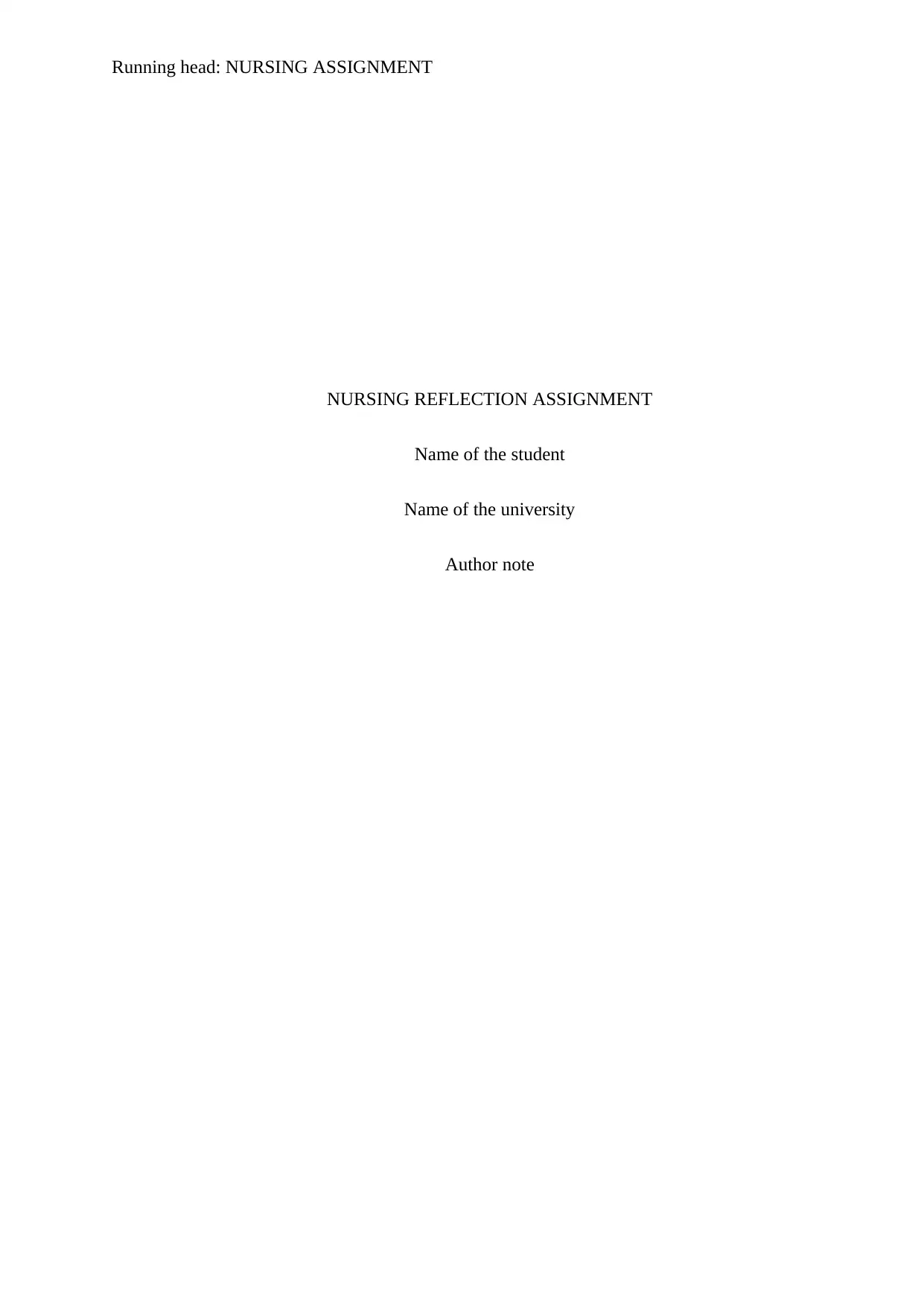
Running head: NURSING ASSIGNMENT
NURSING REFLECTION ASSIGNMENT
Name of the student
Name of the university
Author note
NURSING REFLECTION ASSIGNMENT
Name of the student
Name of the university
Author note
Paraphrase This Document
Need a fresh take? Get an instant paraphrase of this document with our AI Paraphraser
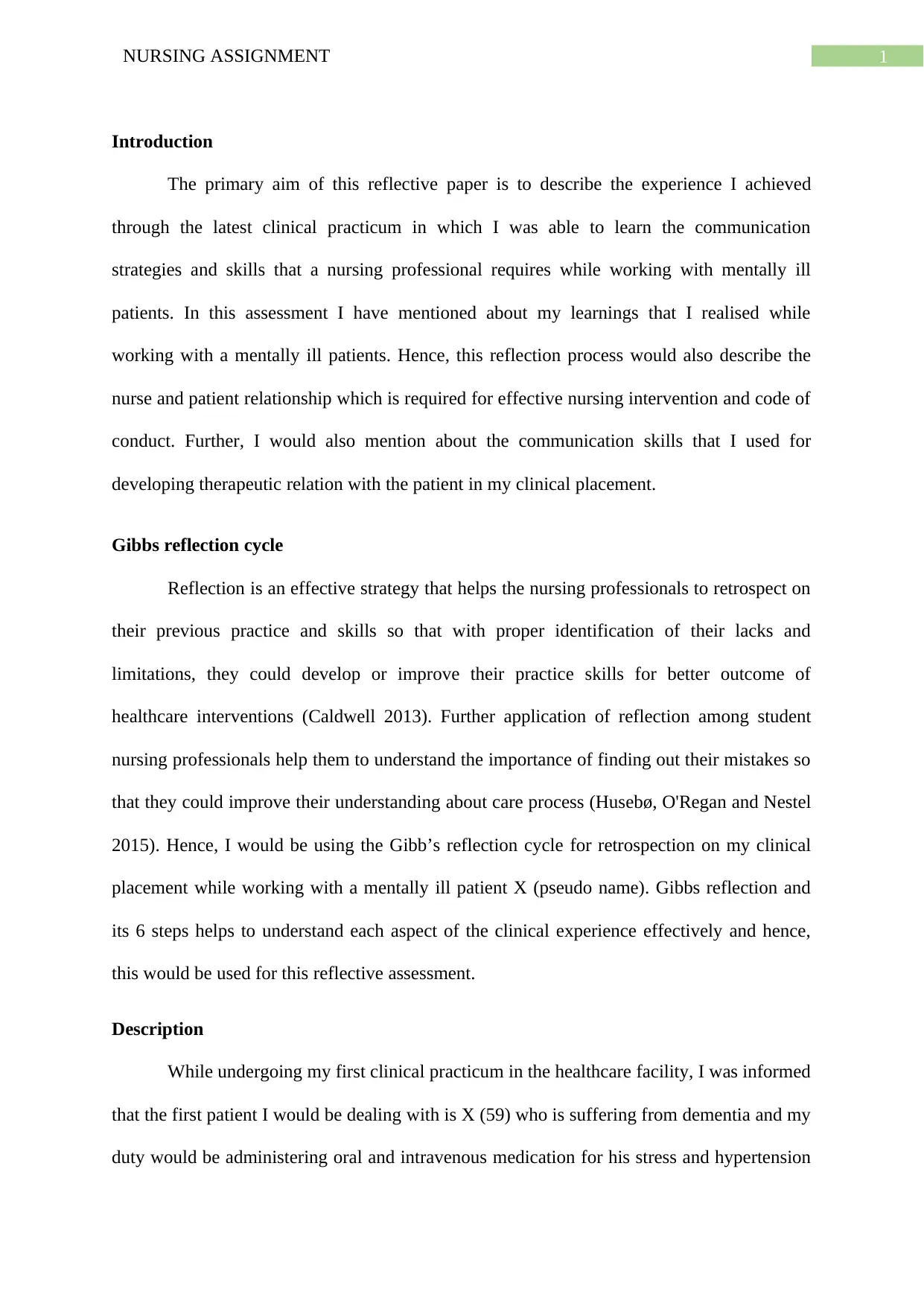
1NURSING ASSIGNMENT
Introduction
The primary aim of this reflective paper is to describe the experience I achieved
through the latest clinical practicum in which I was able to learn the communication
strategies and skills that a nursing professional requires while working with mentally ill
patients. In this assessment I have mentioned about my learnings that I realised while
working with a mentally ill patients. Hence, this reflection process would also describe the
nurse and patient relationship which is required for effective nursing intervention and code of
conduct. Further, I would also mention about the communication skills that I used for
developing therapeutic relation with the patient in my clinical placement.
Gibbs reflection cycle
Reflection is an effective strategy that helps the nursing professionals to retrospect on
their previous practice and skills so that with proper identification of their lacks and
limitations, they could develop or improve their practice skills for better outcome of
healthcare interventions (Caldwell 2013). Further application of reflection among student
nursing professionals help them to understand the importance of finding out their mistakes so
that they could improve their understanding about care process (Husebø, O'Regan and Nestel
2015). Hence, I would be using the Gibb’s reflection cycle for retrospection on my clinical
placement while working with a mentally ill patient X (pseudo name). Gibbs reflection and
its 6 steps helps to understand each aspect of the clinical experience effectively and hence,
this would be used for this reflective assessment.
Description
While undergoing my first clinical practicum in the healthcare facility, I was informed
that the first patient I would be dealing with is X (59) who is suffering from dementia and my
duty would be administering oral and intravenous medication for his stress and hypertension
Introduction
The primary aim of this reflective paper is to describe the experience I achieved
through the latest clinical practicum in which I was able to learn the communication
strategies and skills that a nursing professional requires while working with mentally ill
patients. In this assessment I have mentioned about my learnings that I realised while
working with a mentally ill patients. Hence, this reflection process would also describe the
nurse and patient relationship which is required for effective nursing intervention and code of
conduct. Further, I would also mention about the communication skills that I used for
developing therapeutic relation with the patient in my clinical placement.
Gibbs reflection cycle
Reflection is an effective strategy that helps the nursing professionals to retrospect on
their previous practice and skills so that with proper identification of their lacks and
limitations, they could develop or improve their practice skills for better outcome of
healthcare interventions (Caldwell 2013). Further application of reflection among student
nursing professionals help them to understand the importance of finding out their mistakes so
that they could improve their understanding about care process (Husebø, O'Regan and Nestel
2015). Hence, I would be using the Gibb’s reflection cycle for retrospection on my clinical
placement while working with a mentally ill patient X (pseudo name). Gibbs reflection and
its 6 steps helps to understand each aspect of the clinical experience effectively and hence,
this would be used for this reflective assessment.
Description
While undergoing my first clinical practicum in the healthcare facility, I was informed
that the first patient I would be dealing with is X (59) who is suffering from dementia and my
duty would be administering oral and intravenous medication for his stress and hypertension
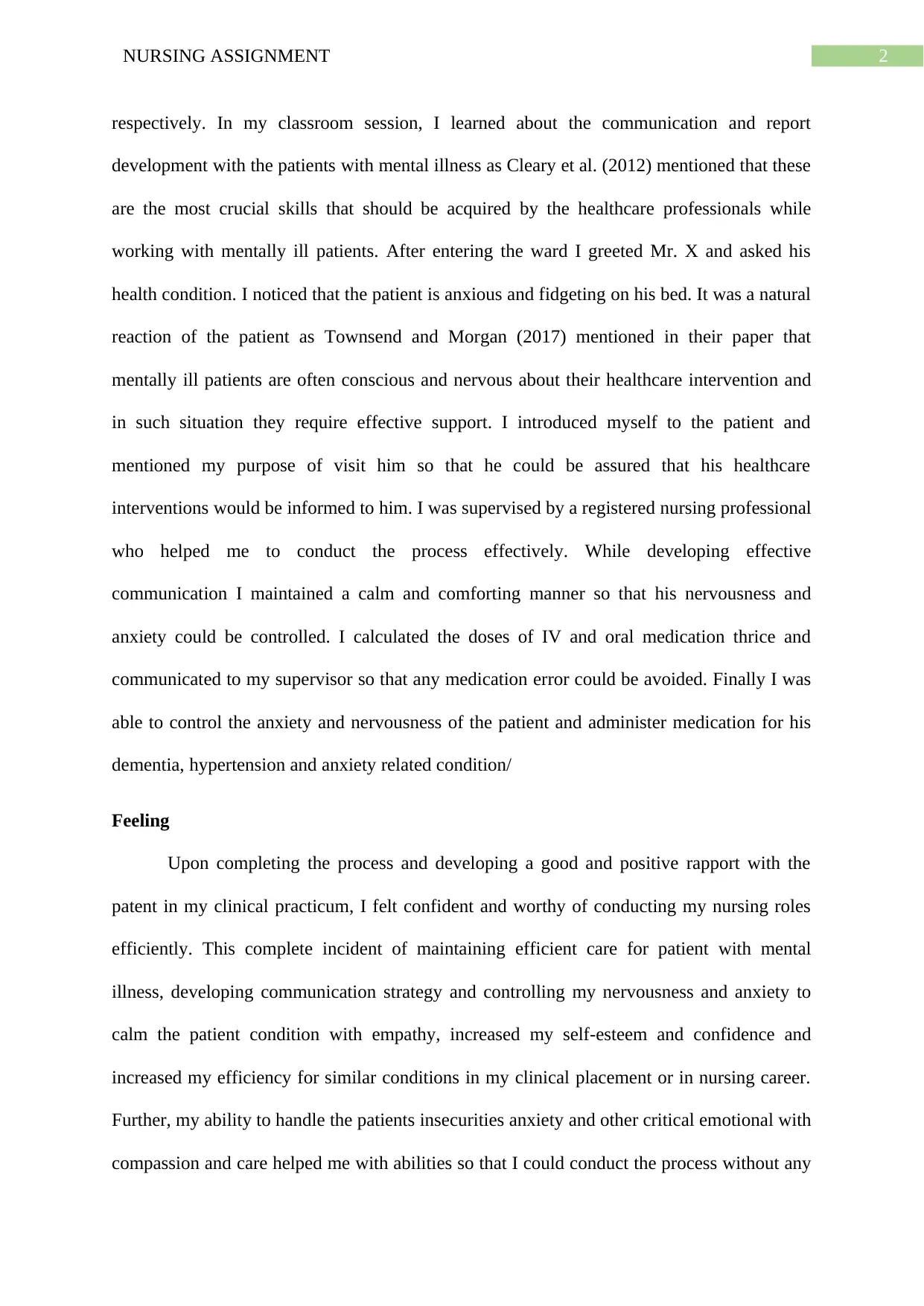
2NURSING ASSIGNMENT
respectively. In my classroom session, I learned about the communication and report
development with the patients with mental illness as Cleary et al. (2012) mentioned that these
are the most crucial skills that should be acquired by the healthcare professionals while
working with mentally ill patients. After entering the ward I greeted Mr. X and asked his
health condition. I noticed that the patient is anxious and fidgeting on his bed. It was a natural
reaction of the patient as Townsend and Morgan (2017) mentioned in their paper that
mentally ill patients are often conscious and nervous about their healthcare intervention and
in such situation they require effective support. I introduced myself to the patient and
mentioned my purpose of visit him so that he could be assured that his healthcare
interventions would be informed to him. I was supervised by a registered nursing professional
who helped me to conduct the process effectively. While developing effective
communication I maintained a calm and comforting manner so that his nervousness and
anxiety could be controlled. I calculated the doses of IV and oral medication thrice and
communicated to my supervisor so that any medication error could be avoided. Finally I was
able to control the anxiety and nervousness of the patient and administer medication for his
dementia, hypertension and anxiety related condition/
Feeling
Upon completing the process and developing a good and positive rapport with the
patent in my clinical practicum, I felt confident and worthy of conducting my nursing roles
efficiently. This complete incident of maintaining efficient care for patient with mental
illness, developing communication strategy and controlling my nervousness and anxiety to
calm the patient condition with empathy, increased my self-esteem and confidence and
increased my efficiency for similar conditions in my clinical placement or in nursing career.
Further, my ability to handle the patients insecurities anxiety and other critical emotional with
compassion and care helped me with abilities so that I could conduct the process without any
respectively. In my classroom session, I learned about the communication and report
development with the patients with mental illness as Cleary et al. (2012) mentioned that these
are the most crucial skills that should be acquired by the healthcare professionals while
working with mentally ill patients. After entering the ward I greeted Mr. X and asked his
health condition. I noticed that the patient is anxious and fidgeting on his bed. It was a natural
reaction of the patient as Townsend and Morgan (2017) mentioned in their paper that
mentally ill patients are often conscious and nervous about their healthcare intervention and
in such situation they require effective support. I introduced myself to the patient and
mentioned my purpose of visit him so that he could be assured that his healthcare
interventions would be informed to him. I was supervised by a registered nursing professional
who helped me to conduct the process effectively. While developing effective
communication I maintained a calm and comforting manner so that his nervousness and
anxiety could be controlled. I calculated the doses of IV and oral medication thrice and
communicated to my supervisor so that any medication error could be avoided. Finally I was
able to control the anxiety and nervousness of the patient and administer medication for his
dementia, hypertension and anxiety related condition/
Feeling
Upon completing the process and developing a good and positive rapport with the
patent in my clinical practicum, I felt confident and worthy of conducting my nursing roles
efficiently. This complete incident of maintaining efficient care for patient with mental
illness, developing communication strategy and controlling my nervousness and anxiety to
calm the patient condition with empathy, increased my self-esteem and confidence and
increased my efficiency for similar conditions in my clinical placement or in nursing career.
Further, my ability to handle the patients insecurities anxiety and other critical emotional with
compassion and care helped me with abilities so that I could conduct the process without any
⊘ This is a preview!⊘
Do you want full access?
Subscribe today to unlock all pages.

Trusted by 1+ million students worldwide
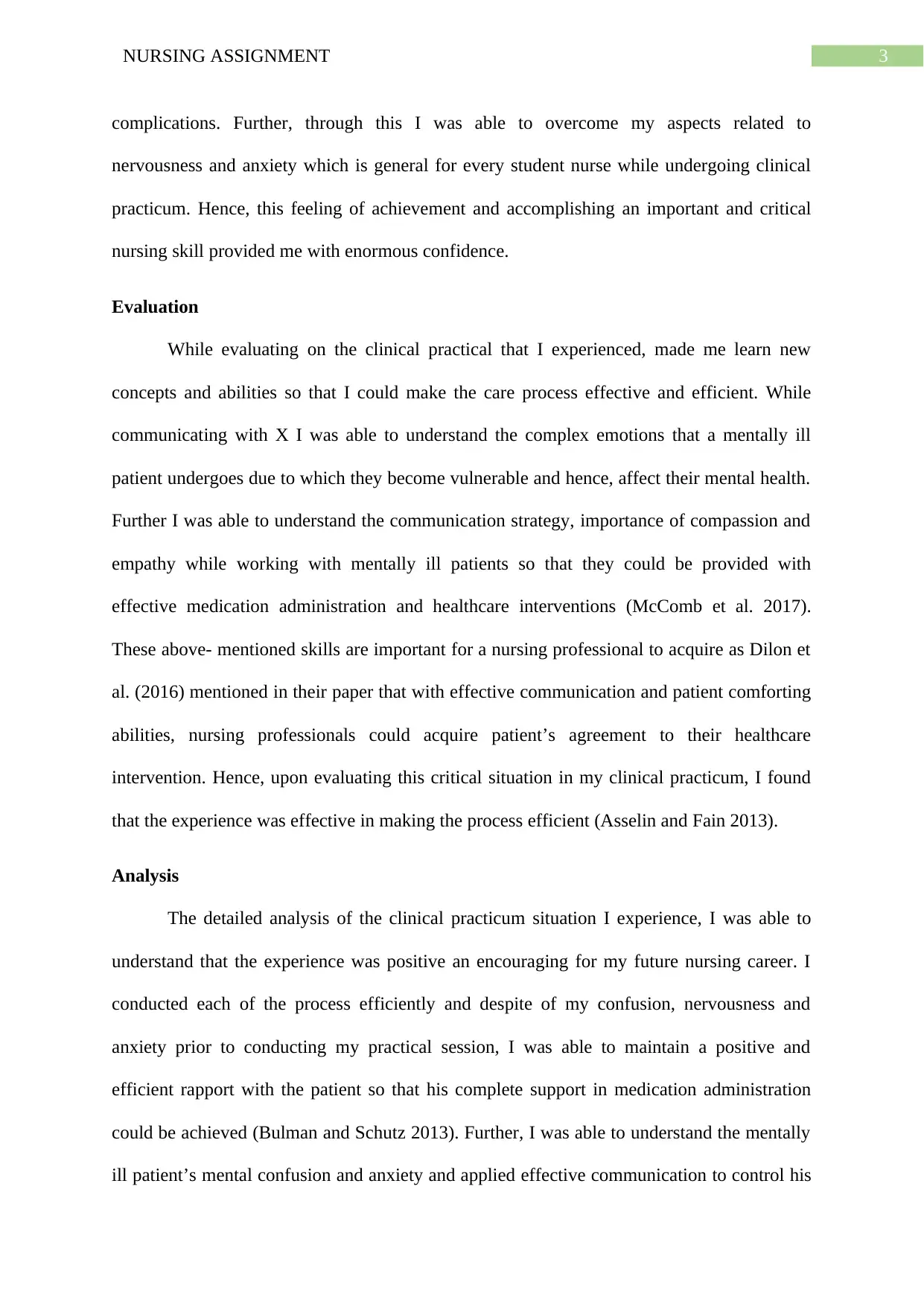
3NURSING ASSIGNMENT
complications. Further, through this I was able to overcome my aspects related to
nervousness and anxiety which is general for every student nurse while undergoing clinical
practicum. Hence, this feeling of achievement and accomplishing an important and critical
nursing skill provided me with enormous confidence.
Evaluation
While evaluating on the clinical practical that I experienced, made me learn new
concepts and abilities so that I could make the care process effective and efficient. While
communicating with X I was able to understand the complex emotions that a mentally ill
patient undergoes due to which they become vulnerable and hence, affect their mental health.
Further I was able to understand the communication strategy, importance of compassion and
empathy while working with mentally ill patients so that they could be provided with
effective medication administration and healthcare interventions (McComb et al. 2017).
These above- mentioned skills are important for a nursing professional to acquire as Dilon et
al. (2016) mentioned in their paper that with effective communication and patient comforting
abilities, nursing professionals could acquire patient’s agreement to their healthcare
intervention. Hence, upon evaluating this critical situation in my clinical practicum, I found
that the experience was effective in making the process efficient (Asselin and Fain 2013).
Analysis
The detailed analysis of the clinical practicum situation I experience, I was able to
understand that the experience was positive an encouraging for my future nursing career. I
conducted each of the process efficiently and despite of my confusion, nervousness and
anxiety prior to conducting my practical session, I was able to maintain a positive and
efficient rapport with the patient so that his complete support in medication administration
could be achieved (Bulman and Schutz 2013). Further, I was able to understand the mentally
ill patient’s mental confusion and anxiety and applied effective communication to control his
complications. Further, through this I was able to overcome my aspects related to
nervousness and anxiety which is general for every student nurse while undergoing clinical
practicum. Hence, this feeling of achievement and accomplishing an important and critical
nursing skill provided me with enormous confidence.
Evaluation
While evaluating on the clinical practical that I experienced, made me learn new
concepts and abilities so that I could make the care process effective and efficient. While
communicating with X I was able to understand the complex emotions that a mentally ill
patient undergoes due to which they become vulnerable and hence, affect their mental health.
Further I was able to understand the communication strategy, importance of compassion and
empathy while working with mentally ill patients so that they could be provided with
effective medication administration and healthcare interventions (McComb et al. 2017).
These above- mentioned skills are important for a nursing professional to acquire as Dilon et
al. (2016) mentioned in their paper that with effective communication and patient comforting
abilities, nursing professionals could acquire patient’s agreement to their healthcare
intervention. Hence, upon evaluating this critical situation in my clinical practicum, I found
that the experience was effective in making the process efficient (Asselin and Fain 2013).
Analysis
The detailed analysis of the clinical practicum situation I experience, I was able to
understand that the experience was positive an encouraging for my future nursing career. I
conducted each of the process efficiently and despite of my confusion, nervousness and
anxiety prior to conducting my practical session, I was able to maintain a positive and
efficient rapport with the patient so that his complete support in medication administration
could be achieved (Bulman and Schutz 2013). Further, I was able to understand the mentally
ill patient’s mental confusion and anxiety and applied effective communication to control his
Paraphrase This Document
Need a fresh take? Get an instant paraphrase of this document with our AI Paraphraser
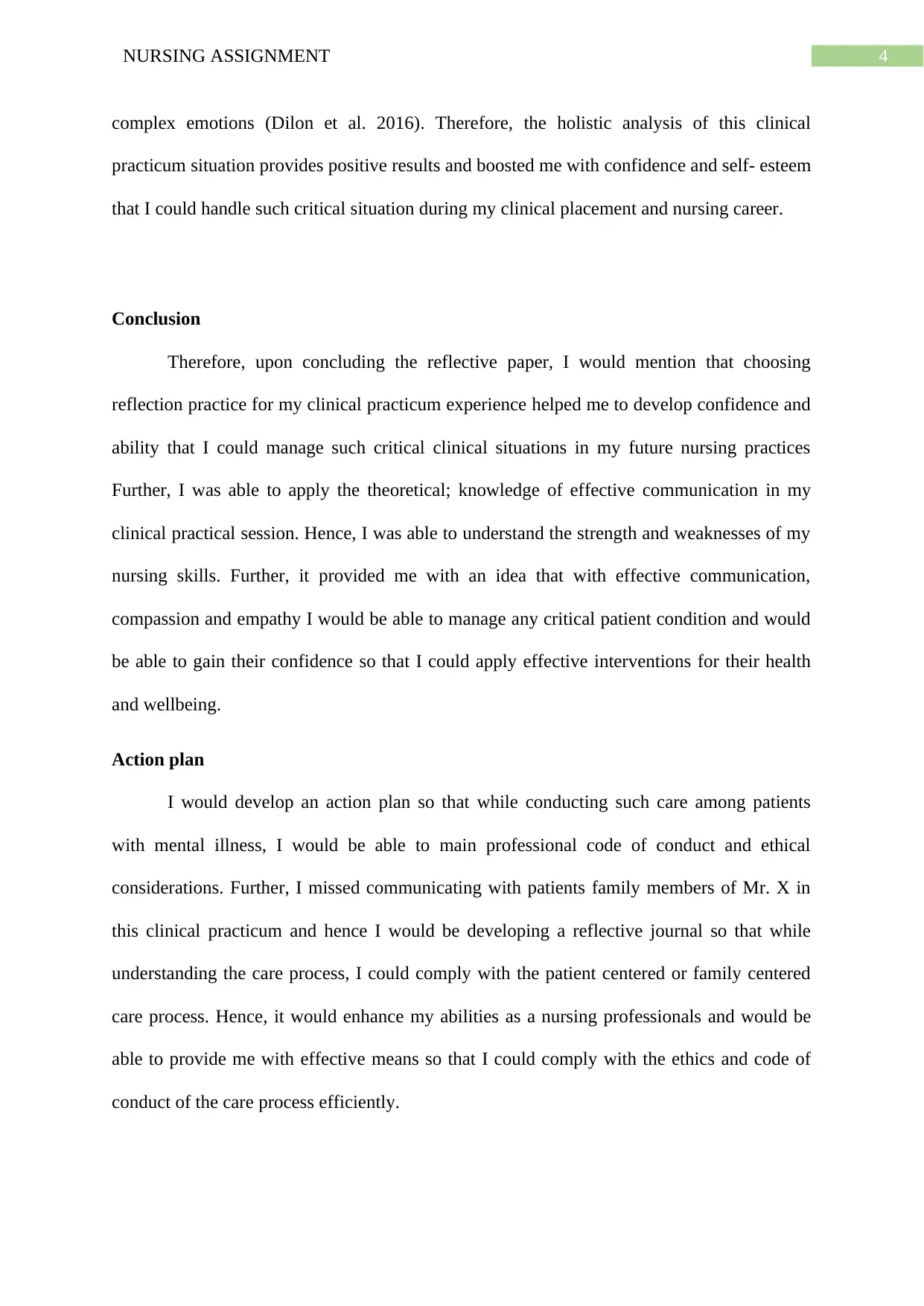
4NURSING ASSIGNMENT
complex emotions (Dilon et al. 2016). Therefore, the holistic analysis of this clinical
practicum situation provides positive results and boosted me with confidence and self- esteem
that I could handle such critical situation during my clinical placement and nursing career.
Conclusion
Therefore, upon concluding the reflective paper, I would mention that choosing
reflection practice for my clinical practicum experience helped me to develop confidence and
ability that I could manage such critical clinical situations in my future nursing practices
Further, I was able to apply the theoretical; knowledge of effective communication in my
clinical practical session. Hence, I was able to understand the strength and weaknesses of my
nursing skills. Further, it provided me with an idea that with effective communication,
compassion and empathy I would be able to manage any critical patient condition and would
be able to gain their confidence so that I could apply effective interventions for their health
and wellbeing.
Action plan
I would develop an action plan so that while conducting such care among patients
with mental illness, I would be able to main professional code of conduct and ethical
considerations. Further, I missed communicating with patients family members of Mr. X in
this clinical practicum and hence I would be developing a reflective journal so that while
understanding the care process, I could comply with the patient centered or family centered
care process. Hence, it would enhance my abilities as a nursing professionals and would be
able to provide me with effective means so that I could comply with the ethics and code of
conduct of the care process efficiently.
complex emotions (Dilon et al. 2016). Therefore, the holistic analysis of this clinical
practicum situation provides positive results and boosted me with confidence and self- esteem
that I could handle such critical situation during my clinical placement and nursing career.
Conclusion
Therefore, upon concluding the reflective paper, I would mention that choosing
reflection practice for my clinical practicum experience helped me to develop confidence and
ability that I could manage such critical clinical situations in my future nursing practices
Further, I was able to apply the theoretical; knowledge of effective communication in my
clinical practical session. Hence, I was able to understand the strength and weaknesses of my
nursing skills. Further, it provided me with an idea that with effective communication,
compassion and empathy I would be able to manage any critical patient condition and would
be able to gain their confidence so that I could apply effective interventions for their health
and wellbeing.
Action plan
I would develop an action plan so that while conducting such care among patients
with mental illness, I would be able to main professional code of conduct and ethical
considerations. Further, I missed communicating with patients family members of Mr. X in
this clinical practicum and hence I would be developing a reflective journal so that while
understanding the care process, I could comply with the patient centered or family centered
care process. Hence, it would enhance my abilities as a nursing professionals and would be
able to provide me with effective means so that I could comply with the ethics and code of
conduct of the care process efficiently.
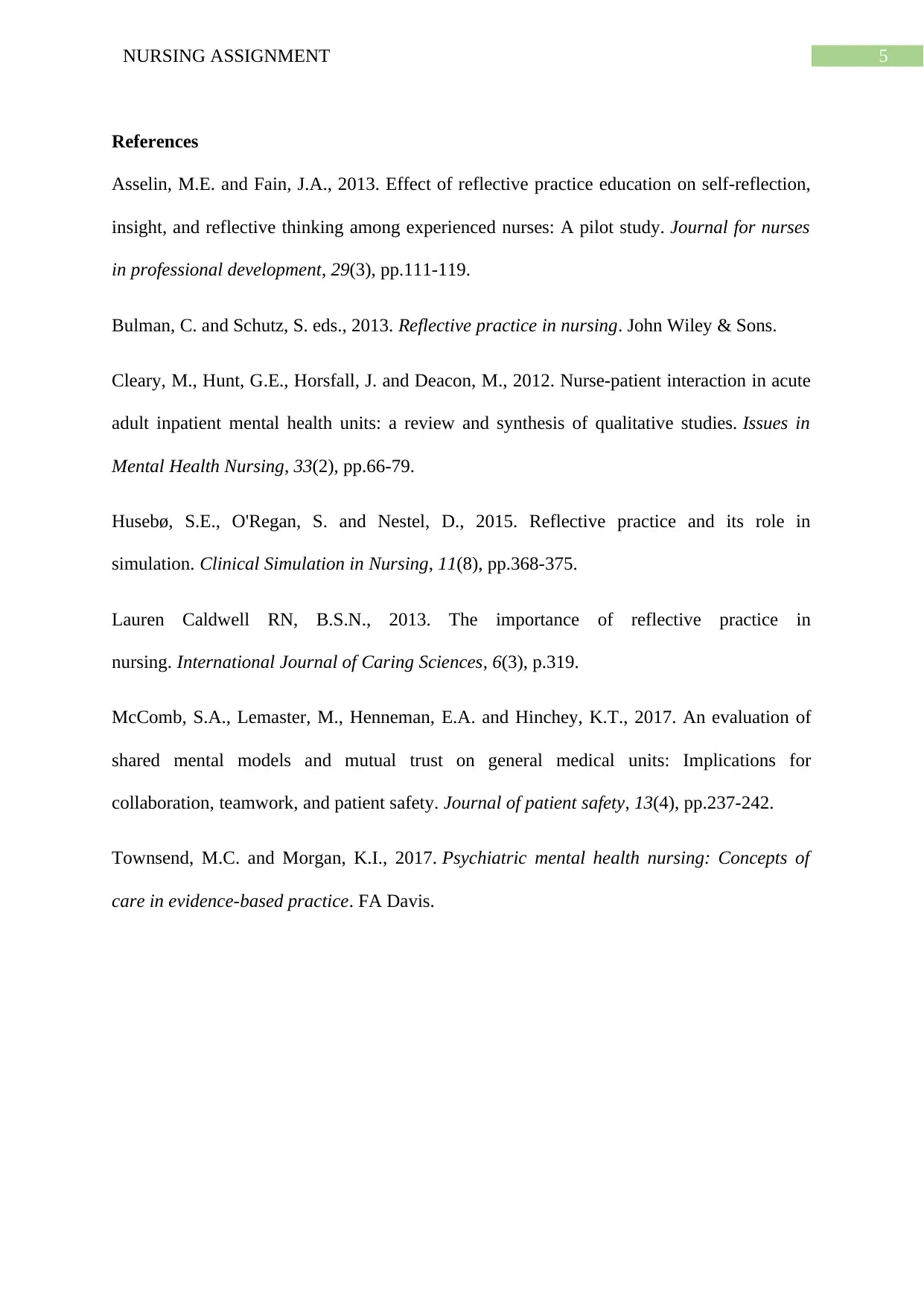
5NURSING ASSIGNMENT
References
Asselin, M.E. and Fain, J.A., 2013. Effect of reflective practice education on self-reflection,
insight, and reflective thinking among experienced nurses: A pilot study. Journal for nurses
in professional development, 29(3), pp.111-119.
Bulman, C. and Schutz, S. eds., 2013. Reflective practice in nursing. John Wiley & Sons.
Cleary, M., Hunt, G.E., Horsfall, J. and Deacon, M., 2012. Nurse-patient interaction in acute
adult inpatient mental health units: a review and synthesis of qualitative studies. Issues in
Mental Health Nursing, 33(2), pp.66-79.
Husebø, S.E., O'Regan, S. and Nestel, D., 2015. Reflective practice and its role in
simulation. Clinical Simulation in Nursing, 11(8), pp.368-375.
Lauren Caldwell RN, B.S.N., 2013. The importance of reflective practice in
nursing. International Journal of Caring Sciences, 6(3), p.319.
McComb, S.A., Lemaster, M., Henneman, E.A. and Hinchey, K.T., 2017. An evaluation of
shared mental models and mutual trust on general medical units: Implications for
collaboration, teamwork, and patient safety. Journal of patient safety, 13(4), pp.237-242.
Townsend, M.C. and Morgan, K.I., 2017. Psychiatric mental health nursing: Concepts of
care in evidence-based practice. FA Davis.
References
Asselin, M.E. and Fain, J.A., 2013. Effect of reflective practice education on self-reflection,
insight, and reflective thinking among experienced nurses: A pilot study. Journal for nurses
in professional development, 29(3), pp.111-119.
Bulman, C. and Schutz, S. eds., 2013. Reflective practice in nursing. John Wiley & Sons.
Cleary, M., Hunt, G.E., Horsfall, J. and Deacon, M., 2012. Nurse-patient interaction in acute
adult inpatient mental health units: a review and synthesis of qualitative studies. Issues in
Mental Health Nursing, 33(2), pp.66-79.
Husebø, S.E., O'Regan, S. and Nestel, D., 2015. Reflective practice and its role in
simulation. Clinical Simulation in Nursing, 11(8), pp.368-375.
Lauren Caldwell RN, B.S.N., 2013. The importance of reflective practice in
nursing. International Journal of Caring Sciences, 6(3), p.319.
McComb, S.A., Lemaster, M., Henneman, E.A. and Hinchey, K.T., 2017. An evaluation of
shared mental models and mutual trust on general medical units: Implications for
collaboration, teamwork, and patient safety. Journal of patient safety, 13(4), pp.237-242.
Townsend, M.C. and Morgan, K.I., 2017. Psychiatric mental health nursing: Concepts of
care in evidence-based practice. FA Davis.
⊘ This is a preview!⊘
Do you want full access?
Subscribe today to unlock all pages.

Trusted by 1+ million students worldwide
1 out of 6
Related Documents
Your All-in-One AI-Powered Toolkit for Academic Success.
+13062052269
info@desklib.com
Available 24*7 on WhatsApp / Email
![[object Object]](/_next/static/media/star-bottom.7253800d.svg)
Unlock your academic potential
Copyright © 2020–2026 A2Z Services. All Rights Reserved. Developed and managed by ZUCOL.





